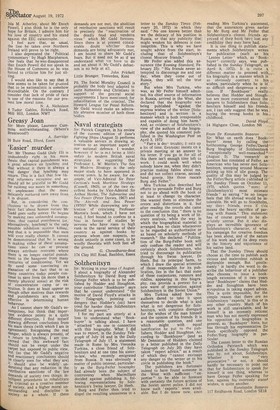Solzhenitsyn
Sir: Writing in your issue cf August 5 about a biography of Alexander Solzhenitsyn by David Burg and George Feifer which is to be published by Hodder and Stoughton, your contributor ' Bookbuyer ' says that he cannot understand "the motive of David Floyd's attacks in the Telegraph, pointing out dangers that Hodder's (sic) have tried far harder than Solzhenitsyn himself to prevent."
I for my part am utterly at a loss to understand what ' Bookbuyer ' is talking about. I have " attacked " no one in connection with this biography. What I did was to report, in the Sunday Telegraph of July 16 and in the Daily Telegraph of July 17, a statement made in Rome by Mrs Veronika Turkina, a close friend of Solzhenitsyn and at one time his sisterin-law, who recently emigrated from Russia. It was obviously a matter of public interest, particularly as the Burg-Feifer biography had already been the subject of controversy when Macmillans decided against publishing it, following representations by Solzhenitsyn's Swiss lawyer, Dr Heeb.
Burg and Feifer then tried to dispel the resulting uneasiness in a
letter to the Sunday Times (February 20, 1972) in which they said: "No one knows better than we the delicacy of his position in Russia, or that any publicity that might weaken his defences is contemptible. This is why we have sought advice from the start, including that of Solzhenitsyn's closest Moscow friends."
Mr Feifer also added this assurance (the Evening Standard, February 25): "His friends never attempted to discourage me and one day, when they come out of Russia, they will tell the true story."
But when Mrs Turkina, who was, as Mr Feifer himself admitted, his chief source of information in Russia, arrived in the West. she declared that the biography was being published "against the express wishes of the writer (Solzhenitsyn-I and is written in a manner which is both irresponsible and capable of doing him harm," And, as evidencl of Solzhenitsyn's view of the authors of the biography, she quoted his comment published in the Washington Post on April 3, 1972:
"Faire is deetrouble; i eats up a lot of time. Everyon: insists on a private meeting or an answer to his letter. If you go in for all of this there isn't enough time left to work. I could work well when nobody knew me, when they didn't practise making fables about me, and did not collect coarse, secondhand gossip, like those rascals Burg and Feifer."
Mrs Turkina also described her efforts to persuade Feifer and Burg not to go ahead with the book or at least to change its character. She wanted them to eliminate the errors and distortions in it, but after reading the proofs she came to the conclusion that " there is no question of its being a work of literary analysis, while the way in which the biographical material is arranged has no claim whatsoever to be regarded as authoritative or as based on scholarly methods of research." She declared: "Publication of the Burg-Feifer book will only confuse the reader and will certainly shock Solzhenitsyn, who tried to discourage its publication through his Swiss lawyer, Dr Heeb. But its principal harm, to which I draw the special attention of those responsible for its publication, lies in the fact that some of these conjectures, rumours and riddles, appearing in this biography, can provide a pretext for a new wave of persecution against Solzhenitsyn in the Soviet Union." Mrs Turkina asked how the authors dared to take it upon themselves to decide what is and what is not dangerous for Solzhenitsyn, with complete disregard for the wishes of the man himself and the opinion of his friends. It is a reasonable question, and one which might with equal justification be put to the publishers, Hodder and Stoughton. According to 'Bookbuyer ' (and as Mr Denniston of Hodders claimed in a letter published in the Daily Telegraph on July 20) they have taken " expert advice," as a result of which they " cannot envisage any danger to the writer or to his circle in publishing the book." The publishers are fortunate indeed to have found someone in the West with sufficient " expertise " to be able to forecast with certainty the future actions of the Soviet secret police. I did not know such ' experts ' were available. But I do know now, since reading Mrs Turkina's statement, that the assurances given earlier by Mr Burg and Mr Feifer that Solzhenitsyn's closest friends apprcved of their book hay:: lost any credibility they may have had.
It is one thing to publish statements which Solzhenitsyn writes for publication (such as his 'Lenten Letter' which, as ' Bookbuyer ' correctly says, was published in the Sunday Telegraph, on April 9, 1972). It is ouite ak different •matter to proceed with.,v his biography in a manner which is so obviously contrary to his1 wishes, particularly when he is in so difficult and dangerous a posi
tion. If ' Bookbuyer ' really believes that Hodder and Stoughton are more concerned about the , dangers to Solzhenitsyn than Solzhenitsyn himself and his friends, are, I can only suggest that he was buying the wrong books in his,„ childhood. • David Floyd, 14 Highgate Close, London N6
































 Previous page
Previous page